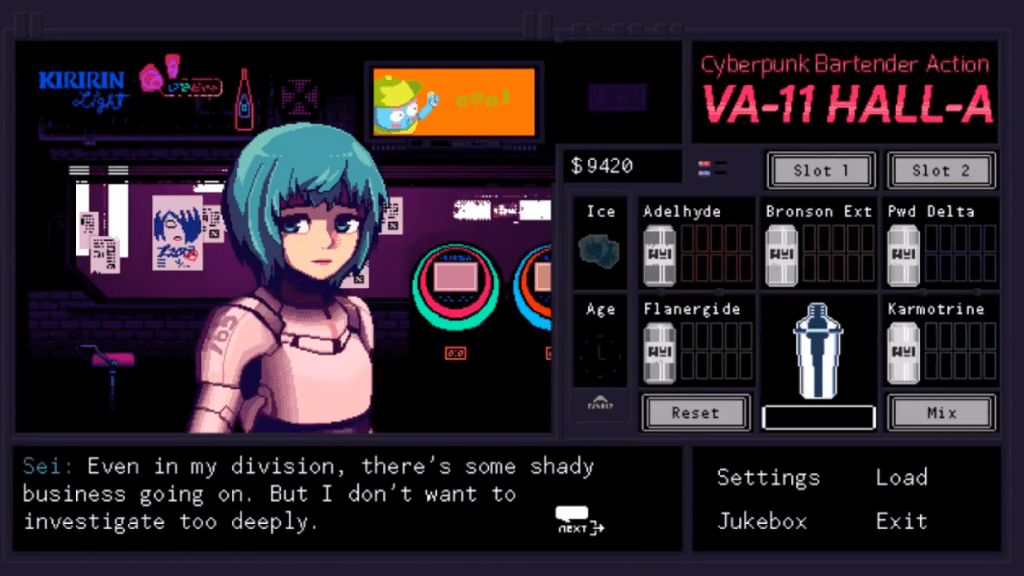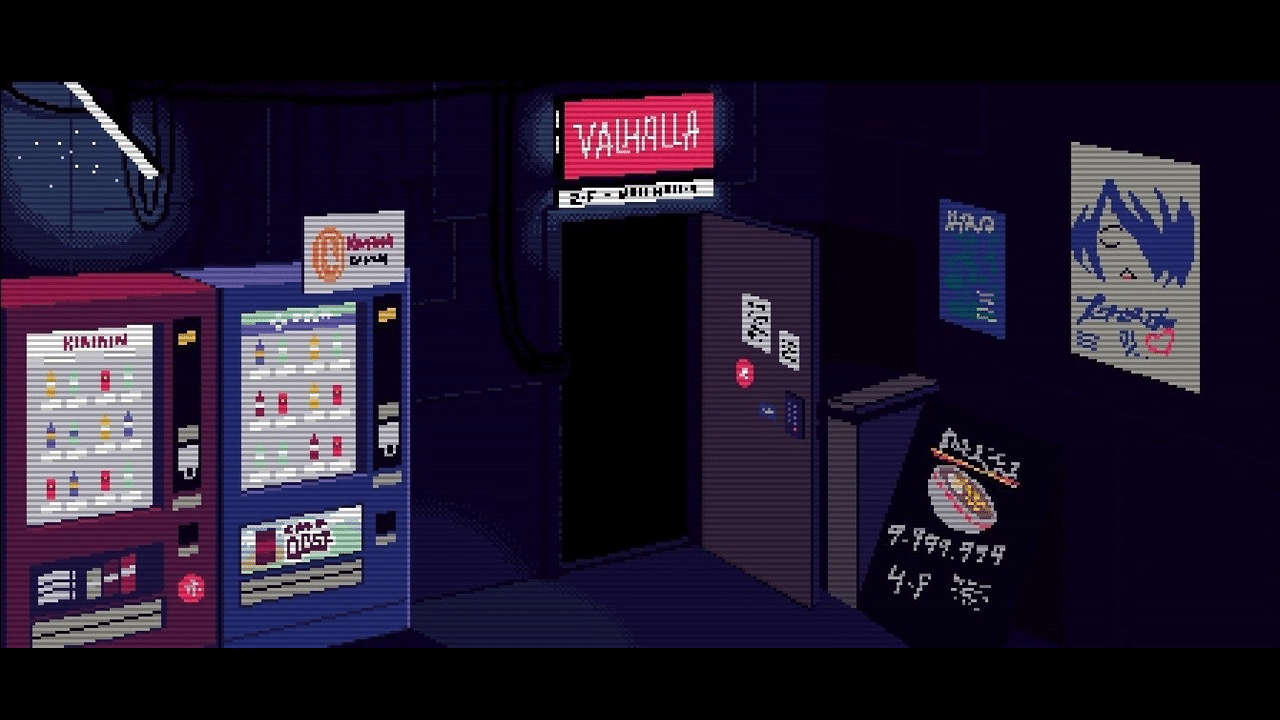VA-11 Hall-A is available on Playstation 4, PS Vita, Nintendo Switch, and all PC platforms.
It's hard for me to consume stories about war.
They always leverage it to say (or attempt to say) something important, and I deeply appreciate that. But for me, they're simply too far removed from my own experience. I'm not and realistically never will be in the military, so the literal battlefield of a war is something I just can't have an analog for. Even class warfare is a tricky business; I line up with what so much of the demographic that media has landed on as a “default”, making me deeply unqualified to comment on a civil-rights story like Detroit: Become Human told from the perspective of the oppressed.
This is, to be painfully clear, the first-worldliest of first-world problems, and I'm supremely lucky to have it. But it does result in a disconnect when, for example, I'm shown imagery of a man shot to death at Normandy, or when an eighth-grade history class spends weeks covering troop movements during a war that happened over a century ago. It directly impacted millions of people, certainly. But which general won what battle isn't really the thing that informs how the vast majority of people lived, and continue to live, their day-to-day lives.
Enter VA-11 Hall-A
Va-11 Hall-A takes place in the middle of a deep dystopia. Disasters both natural and manmade have left their deep marks on society. The government is increasingly overbearing, and discontent is spurring the populace to bite back, both openly and subtly.
And you aren't a direct actor in any of those things.
You're a bartender, just trying to scrape enough tips together to meet your rent payments while this all happens off-screen.
It comes back to you, of course. Any wide-reaching conflict is hard to escape. But it trickles back into your life in more insidious ways. The news writers who come by for a beer become more and more harried for the mounting restrictions on what and how they can report. You worry over a regular patron, a paramedic, when she stops coming by after a hostage situation makes headlines. Your coworker bickers with you over whether that noise outside was a firecracker, a car backfiring, or honest-to-goodness gunfire.
And all you can do is stay there, behind your bar, talking it out with your customers.
And that may just make Va-11 Hall-A one of the most grounded – and, as a result, most useful – depictions of civil unrest I've ever seen.

It's indirect.
But so is most of how we take in the world. VA-11 Hall-A isn't an action game, just like how most of us don't live action lives. It's why I love these “low-perspective” games like the Japan-only City Shrouded in Shadow or soon-to-be-released Disaster Report.
If a bombing happened downtown tomorrow, there's so little chance that either you or I individually would at the scene. It would be dramatic, but not realistic; realistically, we'd hear about it from a news article, or (more likely) social media. If an earthquake happens, we're not likely to run around heroically pulling people out of sinkholes or building up our own community of survivors or whatever. That would be empowering and satisfying, but rarely do we feel empowered or satisfied by a crisis; we feel compelled to scrape together what we can and get the heck out of Dodge.
Not being present or active in these events doesn't mean that we leave sympathy by the wayside, of course. Keeping a distance and prioritizing self-concern isn't exactly the thing we like to lift up as an ideal. Still, it hardly excludes you from concern for others; in fact, it makes it even more imperative and gives an emotional context to what little help you can offer. Those “on the front lines” do good and valuable work, but do those offering a cool drink or an open ear. And it's in doing so that the full reach of a conflict starts to speak to you.
The terrorist attack on a bank certainly makes its statement – and accelerates the unemployment of nearly every person you talk to on a daily basis.
People making arguably-right stands against laws enforcement force important changes – and strike fear in those genuinely working to do better within the system.
A general sense of unrest prompts the world to adapt to better serve its people tomorrow – and prompts you to huddle to sleep under the bar counter today, too terrified to walk home at night with or without someone else around.
And really, that's what speaks to me the most. A violent death is, for how terrible and visible it can be, still fairly rare. Persistent, overbearing dread is far more widespread, and something that we all have to get through before seeing that more promising future. And, while you aren't necessarily helping those most in need in Va-11 Hall-A, you're arguably helping a representation of more people, all with their own needs and insecurity.

It's still not universal.
It definitely doesn't portray the worst of a situation, or pretend to reflect how everyone experiences conflict. The violent, direct side of it is still at the core of all these things, and we can't responsibly distance ourselves too far from that fact.
But there are other stories that dig into the worse corners of a conflict more deeply, and that's not what VA-11 HALL-A is trying to show us.
VA-11 HALL-A isn't a power fantasy nor a victim fantasy. It's trying to be as honest as possible about how we might slip into a bad future. It's about what that might look like day to day, and how best to endure it.
Quietly, resolutely, together.

